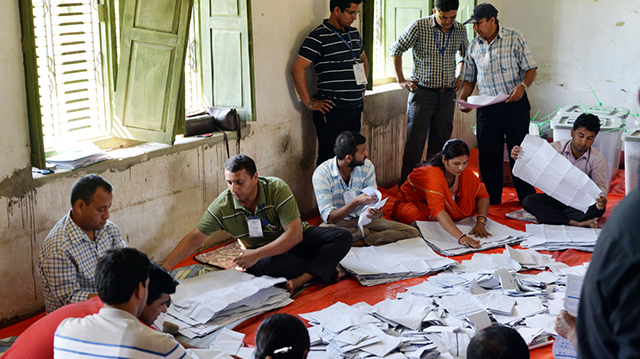Is democracy too expensive for Nepal?

Garima Shah was a candidate from the UML party twice in the 2008 and 2017 elections. She lost both times but was elected to the House through the Proportional Representation (PR) system in the 2013 polls.
She entered the political arena as a student leader in the post-Panchayat period, but in 2009 she had to sell her private school to pay off the piling election debt. Today she is Far-Western Province in-charge for the breakaway CPN (Unified Socialists).
But even as Nepal’s political parties and leaders hit the campaign trail ahead of the next election in 2023, Shah has been living with the financial consequences of her two unsuccessful runs for office.
“We have to think twice even if we were allowed to run for office this time around, with the burden of election expenses,” says Shah. “Securing election funding is a struggle for women leaders across the country.”
Costly elections have had a direct impact on women campaigning for office. Indeed, the number of women elected to office has steadily declined during each of Nepal’s three post-conflict Constituent Assembly elections: from 197 in 2008 to 176 in 2013.
Similarly, 90 women were elected to office in 2017, only six of whom were selected through the first past the post system.
While direct elections are for Nepal’s male politicians, it seems women are only able to get into the legislature through the proportional representation quota.
“Money is the main reason why parties do not trust us women in elections, which means capable women are unlikely to come forward and run,” says a UML leader who did not want to be named.
Post-convention, UML sets eyes on elections, Santa Gaha Magar
Former Minister Kamala Roka of the Maoist Centre was elected to Parliament from East Rukum in 2017, but the debt she incurred during her election campaign is a constant source of worry.
“My expenses were relatively low compared to the others, but I still have not been able to pay off the money we spent to feed and accommodate staff,” she says.
Roka realised that minorities including women, Dalits and Nepal’s low-income communities would face an uphill battle in elections because the environment is not conducive to people from those communities who might decide to run for office.
“If our electoral system continues to operate this way, only the rich and powerful, political contractors and brokers can afford to run and win elections in Nepal,” she adds.
Women MPs are so heavily in debt that they cannot afford to stay in Kathmandu even with the allowance for legislators.
“Nepali leaders unable to accept women in power”, Nepali Times
“A good chunk of money goes towards rent, travelling to my constituency, paying a levy to the party, supporting various causes and organisations — which my salary and allowances are not able to cover,” adds Roka.
Asha Kumari BK is an MP from Bajhang, and says that her monthly expenses including travel back and forth from Kathmandu and contributions to the party average Rs85,000 every month against her MOP allowance of Rs64,000.
“Running for elections is impossible for Nepali women, excepting few, in the current climate,” she says. “If this continues, no honest politician can afford to stand for office.”
MP Tham Maya Thapa was elected from Myagdi in Nepal’s first election under the multi-party system in 1991. “In those days, we would be fed by the families we met along the campaign trail, and if there was nothing else, there was always roasted corn and beans that we would always bring with us,” recalls Thapa.
Despite that, she defeated her opponent by 5,000 votes. Thapa says there is no way she can afford to campaign these days.
Battle lines drawn for Nepal elections, Nepali Times
Salma Khatun, a former journalist who is now the deputy chief of Pokhariya Municipality of Parsa, has also taken out loans to pay for expenses after being elected to office.
“Campaigning in 2023 is going to cost a million rupees at the least," says Khatun, considered by many to be the mayoral or state parliamentarian contender to watch in the upcoming election. “I had financial support from my family in the last election, but how long am I going to ask them to shoulder such a burden?”
Khatun and Asha Kumari BK agree that there is no place for integrity in Nepali politics given the financial constraints faced by many elected and hopeful leaders.
“I have seen many capable women decide not to run for office once they realise how costly it is,” says Khatun. “Parties pick candidates based on their electability determined by how much money they have and are willing to spend. Leaders who are actually willing to put in the work are not considered at all.”
Minister for Women, Children and Senior Citizens Uma Regmi has run for office multiple times, and the Nepali Congress leader says that even after elections are fought and won, women leaders have to keep paying back loans for a long time.
She has been advocating a fully proportional electoral system and adds that elections have become a hotbed for corruption, concluding that the first past the post system is actually undermining democracy.
Kamala Roka is also a proponent of a fully proportional electoral system. The leader from the Maoist Centre party says: “If we want to elect dedicated leaders who have made great sacrifices to serve the people then all of Nepal’s political parties must actively work on an alternative to Nepal’s current electoral system.”
Read also: Women leaders seen, but not heard, Shristi Karki




